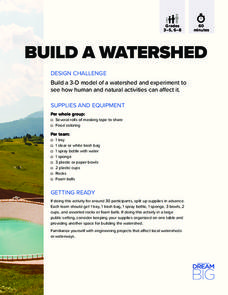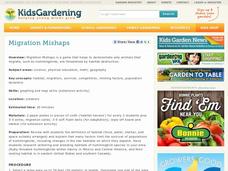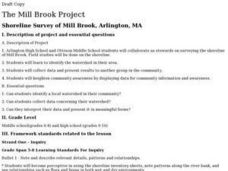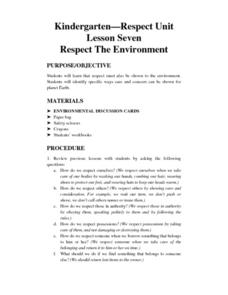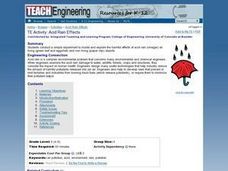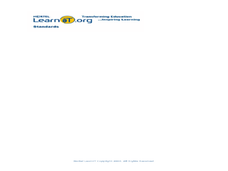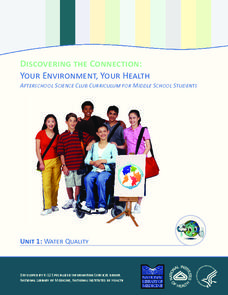Clean Up Australia
Why are Batteries Harmful to the Environment?
Open this lesson plan by reading together about primary and secondary batteries (such as nickel-cadmium cells), problems they can cause in the environment, and how humans can minimize the damage. Afterward, little ones examine a...
Serendip
Evolution of Fur Color in Mice – Mutation, Environment and Natural Selection
Most species of animals include a variety of fur or hair color, but why? Scholars watch a video about a changing environment for mice. As the rocks around them change hues, different colors of mice begin to thrive. Discussion questions...
Curated OER
Every Student Counts: Building a Positive Learning Environment
Join in the effort to end bullying through building a positive learning environment for everyone.
Curated OER
"Croak" Science Mystery
Solve the mystery of a declining frog population! Lead your junior ecologists on an investigation that simulates actual events concerning pollution, predation, poaching, and more. Investigators read a story online, then analyze survey...
Curated OER
Hurricanes: An Environment of Concern
Students study hurricanes and research the damage done by hurricane Katrina. In this environment investigative lesson students divide into groups and complete a given assignment.
National Library of Medicine
Your Environment, Your Health: Chemicals in Your Home
Many people know about chemical pollution, but are all chemicals bad? The third unit in a series of six addresses chemicals common in everyday life. Scholars learn about the chemicals found in their own homes, chemical safety, and...
DiscoverE
Build a Watershed
What's the best way to learn how watersheds work? Build one! Combining engineering, the water cycle, and ecology concerns, the activity is the perfect fit for an interdisciplinary unit. Teams construct a model watershed with simple...
National Gardening Association
Migration Mishaps
Elementary ecologists pretend to be migratory hummingbirds. They fly between wintering and nesting grounds, trying to reach a habitat haven. In a musical-chair fashion, some birds will miss out, and are removed from the game. To further...
King Country
Lesson 1: Introductory Class
This first lesson in a unit on Family Life and Sexual Health (FLASH) has class members establishing the rules of behavior that will create a safe environment for the discussion of these sensitive topics.
Curated OER
The Study of Urban and Suburban Environments within the Mystic River Watershed
High school students examine their own water-based environments, within the Mystic Watershed. As the learners engage in inquiry-based, hands-on projects, critical thinking skills and problem-solving, the project will lead them to cross...
Chicago Botanic Garden
Faces of Climate Change
Sometimes, the best solution to a problem can be found by walking in someone else's shoes. Here, scholars use character cards to take on the roles of people around the world. They determine how their character's life affects our...
Berkshire Museum
Meet a Naturalist: Researching, Writing, Interviewing
Young scholars reach out into the community and learn about different environmental science careers in this inquiry-based instructional activity. Beginning with a short research assignment, children gain background knowledge about...
Creative Learning Exchange
Lesson Plans From The Lorax
When it comes to the environment, no variable is constant. Class members graph behavior over time for the thneeds produced over truffula trees chopped down over the course of Dr. Seuss's The Lorax.
Curated OER
Kindergarten-Respect Unit (Lesson Seven) Respect The Environment
Students review the concept of respect and that they should respect, not only themselves, but those around them. They comment on some example pictures in which the environment is NOT being respected and decide what should have been done...
Howard Hughes Medical Institute
What is My Carbon Footprint?
Here is a lesson that walks youth through an online carbon footprint calculator produced by the University of California, Berkeley. Once learners finish inputting information, they compete a worksheet with the results. This is simple,...
Curated OER
Discussion: The Environment
In this dicussion on environment worksheet, students ask and answer questions concerning the environment.
Curated OER
Acid Rain Effects
Get out the goggles and conduct a simple experiment to model and explore the harmful effects of acid rain (vinegar) on living (green leaf and eggshell) and non-living (paper clip) objects. Young chemists observe and describe the harmful...
CFR Washington
Urbanization and Wildlife
Urbanization and how it affects wildlife is the focus of a presentation that uses statistics to make a case for concern and change.
Curated OER
Oil and the Environment
Young scholars present information regarding oil and how it affects the environment. In this environmental awareness lesson, students work in groups to write a paper, create a PowerPoint, and put together a poster about their specific...
Curated OER
A Generation that Cares: Saving our Environment!
Students discover the dangers posing our environment. In this environmental awareness lesson, students investigate problems like global warming and pollution and discuss ways their generation can solve these issues. Students research...
Curated OER
How Do Artists Get Their Ideas? Culture and Environment as Sources of Ideas
Students share the difficulties they have in determining what to write or draw for a project. In groups, they view examples from three different artists and discuss how their personal experiences affected their art. They brainstorm a...
National Library of Medicine
Your Environment, Your Health: Water Quality
How important is water quality where you live? The first module in a six-unit series includes four lessons on water quality. By applying the concept directly to the lives of pupils, they engage in meaningful learning. They read about...
University of Southern California
What's the Catch?
There must be a catch! A comprehensive lesson looks at ocean fishing concerns through a set of five hands-on activities. Learners become aware of the risks of seafood contamination and factors that have affected the ocean environment.
NPR
Define the Plastic Problem
Individuals identify a specific problem concerning plastics and write a problem statement, which describes the problem, explains why it's a problem, and identifies desired solutions.








